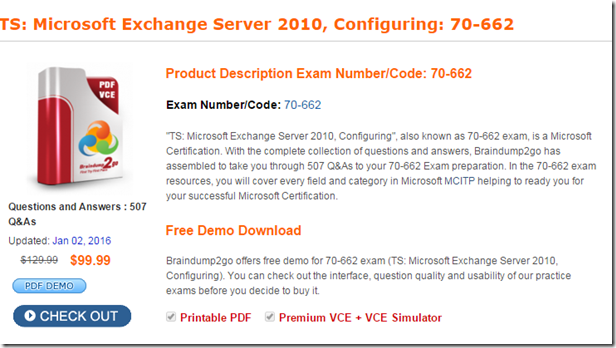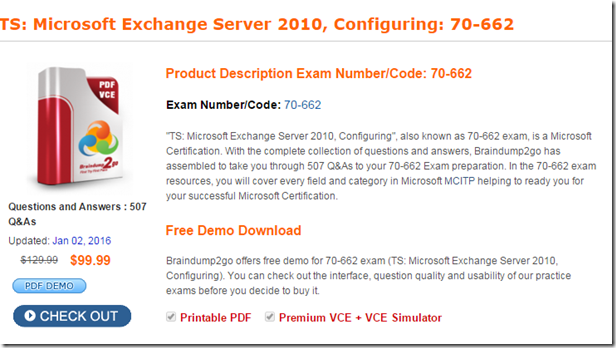MICROSOFT NEWS: 70-662 Exam Questions has been Updated Today! Get Latest 70-662 VCE and 70-662 PDF Instantly! Welcome to Download the Newest Braindump2go 70-662 VCE&70-662 PDF Dumps: http://www.braindump2go.com/70-662.html (507 Q&As)
Laest 70-662 PDF Dumps and 70-662 VCE Dumps can be downloaded from Braindump2go Now! This New Updated 70-662 Exam Dumps has 507q in all! All Braindump2go 70-662 Exam Questions and Answers are formulated and verified by experienced IT professionals! We guarantee all of you can pass 70-662 Exam successfully!
Exam Code: 70-662
Exam Name TS: Microsoft Exchange Server 2010, Configuring
Certification Provider: Microsoft
Corresponding Certifications: MCITP, MCITP: Enterprise Messaging Administrator on Exchange 2010, MCTS, MCTS: Microsoft Exchange Server 2010, Configuring
70-662 Dumps,70-662 PDF,70-662 PDF eBook,70-662 Braindump,70-662 Study Guide,70-662 Book,70-662 Practice Test,70-662 Dumps PDF,70-662 VCE,70-662 VCE Dumps,70-662 Valid Dumps,70-662 Exam Questions Free,70-662 Dumps,70-662 Free Dumps,70-662 Questions and Answers Free,70-662 Braindump PDF,70-662 Braindump VCE,70-662 Preparation

QUESTION 231
You have an Exchange organization.
All servers in the organization have Exchange Server 2010 Service Pack 1 (SP1) installed.
You need to ensure that each user who sends a meeting request to a room mailbox receives a custom message from the mailbox.
What should you do from the properties of the mailbox?
A. Enable the Resource Booking Attendant.
B. Configure the Account settings.
C. Configure the Mail Flow settings.
D. Configure the Resource Policy settings.
E. Configure the Mailbox Features settings.
F. Configure the Resource Information settings.
G. Configure the Resource In-Policy Requests settings.
H. Configure the Resource Out-of-Policy Requests settings.
Answer: F
Explanation:
Custom messages are configured in the Resource Information settings:

QUESTION 232
You have an Exchange Server 2010 Service Pack 1 organization that contains 20 mailbox databases.
You configure each database to retain all deleted items for 30 days.
You need to ensure that all items that pass the retention period are permanently deleted daily between 02:00 and 06:00.
Which cmdlet should you use?
A. Set-MailboxDatabase
B. Set-MailboxServer
C. Set-OrganizationConfig
D. Set-RetentionPolicy
Answer: A
QUESTION 233
You have an Exchange organization.
All servers in the organization have Exchange Server 2010 Service Pack 1 (SP1) installed.
Users access their mailboxes by using Microsoft Outlook 2010 and Outlook Web App (OWA). Users report that they cannot open Information Rights Management (IRM) protected e-mail messages in OW A.
Users can open IRM protected e-mail from Outlook 2010.
You need to ensure that the users can open IRM protected e-mail in OWA.
What should you do?
A. Modify the organization# s IRM configuration for OWA.
B. Instruct the users to add the OWA URL to their Trusted sites.
C. Add a Federated Delivery mailbox to the Active Directory Rights Management Services
(AD RMS) SuperUsers group.
D. Modify the Active Directory Rights Management Services (AD RMS) Prelicensing Agent on
the Hub Transport servers.
Answer: C
QUESTION 234
Your company has a main office and 20 branch offices.
Each office contains an Exchange Server 2010 Mailbox server and an Exchange Server 2010 Hub Transport server.
Each office is configured as a separate Active Directory site.
Each branch office site has one IP site link that connects to the main office site.
You need to ensure that all email sent between offices is routed through the Hub Transport server in the main office.
What should you do?
A. From the Exchange Management Shell, run the Set-ADSite cmdlet.
B. From the Exchange Management Shell, run the Set-ADSiteLink cmdlet.
C. From the Exchange Management Console, modify the Receive connector for the Hub
Transport server in the main office.
D. From the Exchange Management Console, create a new Send connector for each branch
office. Configure the Hub Transport server in the main office as a source server for each
Send connector.
Answer: A
Explanation:
http://technet.microsoft.com/en-us/library/bb124548
QUESTION 235
You have an Exchange organization.
All servers in the organization have Exchange Server 2010 Service Pack 1 (SP1) installed.
You have a database availability group (DAG) that contains two servers named MBX1 and MBX2. You discover that a mailbox database named DB2 is in a FailedAndSuspended state on MBX2. You need to reseed DB2 to MBX2.
You must achieve this goal by using the minimum amount of administrative effort.
Which cmdlet should you run?
A. Restore-DatabaseAvailabilityGroup
B. Resume-MailboxDatabaseCopy
C. Set-DatabaseAvailabilityGroup
D. Update-MailboxDatabaseCopy
Answer: D
Explanation:
If the database has been offline for an extended period, you may have to reseed it. To do this, follow these steps:
1- Suspend replication to the database if it is not already suspended. To do this, run the following command:
Suspend-MailboxDatabaseCopy <databaseName>\<ReplicaServerName>
2- Reseed the database copy. To do this, run the following command:
Update-MailboxDatabaseCopy <databaseName>\<ReplicaServerName>-SourceServer <ActiveServerName> -DeleteExistingFiles:$True
3- Resume replication. To do this, run the following command:
Resume-MailboxDatabaseCopy <databaseName\<ReplicaServerName>

QUESTION 236
You install two Exchange Server 2010 Service Pack 1 (SP1) Edge Transport servers named Edge1 and Edge2.
You need to ensure that e-mail is sent only to Edge2 if Edge1 fails.
What should you do?
A. Create two MX records.
Assign the MX record for Edge1 a priority of 1.
Assign the MX record for Edge2 a priority of 5.
B. Create two MX records.
Assign the MX record for Edge1 a priority of 5.
Assign the MX record for Edge2 a priority of 1.
C. Create two A records that use the same name.
Create one MX record that uses the FQDN of the A record.
Assign a priority of 0 to the MX record.
D. Create two CNAME records that have the same name.
Create one MX record that uses the FQDN of the CNAME records.
Assign a priority of 0 to the MX record.
Answer: A
Explanation:
The mail exchanger (MX) resource record shows the DNS domain name for the computer or computers that process mail for a domain. If multiple mail exchanger (MX) resource records exist, the DNS Client service attempts to contact mail servers in the order of preference from lowest value (highest priority) to highest value (lowest priority).

QUESTION 237
You have two Exchange Server 2010 Service Pack 1 (SP1) servers named Server1 and Server2. Both servers have the Client Access, Hub Transport, and Mailbox server roles installed.
The servers are members of a database availability group (DAG).
You need to ensure that all Microsoft Outlook users automatically connect to an available Client Access server if a single server or service fails.
What should you do?
A. Create a Client Access server array.
Create a new DNS record and add the IP addresses of both Client Access servers to the new
DNS record.
B. Deploy a hardware load balancer.
Create a DNS record for the virtual IP address of the load balancer.
Create and configure a Client Access server array.
C. Install the Network Load Balancing feature on both servers.
Assign a second IP address to each server.
Create a Client Access server array and a new DNS record for the array.
D. Remove Server2 from the DAG.
Create a Client Access server array, and then enable Datacenter Activation Coordination.
Install the Network Load Balancing feature on both servers.
Answer: B
QUESTION 238
Your network contains an Exchange Server 2010 Service Pack 1 (SP1) Edge Transport server named Server1.
You install a new Exchange Server 2010 SP1 Edge Transport server named Server2.
You need to copy all of the Edge Transport configurations from Server1 to Server2.
Which two actions should you perform on Server1? (Each correct answer presents part of the solution. Choose two.)
A. Back up the system state.
B. Run the ExportEdgeConfig.PS1 script.
C. Run the Export-ExchangeCertificate cmdlet.
D. Run the New-EdgeSyncServiceConfig cmdlet.
E. Run the Export-TransportRuleCollection cmdlet.
Answer: BE
Explanation:
ExportEdgeConfig.PS1
You can use the provided Shell scripts to duplicate the configuration of a computer that has the Microsoft Exchange Server 2010 Edge Transport server role installed. This process is referred to as cloned configuration.
Cloned configuration is the practice of deploying new Edge Transport servers based on the configuration information from a previously configured source server. The configuration information from the previously configured source server is copied and exported to an XML file, which is then imported to the target server.
Edge Transport server configuration information is stored in Active Directory Lightweight Directory Services (AD LDS) and isn’t replicated among multiple Edge Transport servers. By using cloned configuration, you can make sure that every Edge Transport server that’s deployed in the perimeter network is operating by using the same configuration.
Export-TransportRuleCollection
Use the Export-TransportRuleCollection cmdlet to export a transport rule collection used by the Transport Rules agent on a computer running Microsoft Exchange Server 2010 that has the Hub Transport server role or the Edge Transport server role installed.
QUESTION 239
You need to ensure that a room mailbox automatically accepts meeting requests.
What should you do?
A. Modify the mailbox permissions.
B. Enable moderation for the mailbox.
C. Assign a managed folder mailbox policy.
D. Enable the resource booking attendant.
Answer: D
Explanation:

QUESTION 240
You have a server that runs Windows Server 2008 Service Pack 2 (SP2).
You plan to install Exchange Server 2010 Service Pack 1 (SP1) on the server.
You need to install the Exchange Server 2010 SP1 prerequisites for the Mailbox, Client Access, and Hub Transport server roles.
What should you do from the server?
A. Install Microsoft .NET Framework 3.5 Service Pack 1 (SP1)
B. Install Windows Management Framework
C. Run ServerManagerCmd.exe IP Exchange-Typical.xml
D. Install Microsoft .NET Framework 3.5 Service Pack 1 (SP1)
E. Install Windows Remote Management (WinRM) 2.0
F. Run ServerManagerCmd.exe IP Exchange-Base.xml
G. Install Windows Management Framework
H. Install Message Queuing
I. Install the Web Server role
J. Install Windows Management Framework
K. Install the Web Server role
L. Install the RPC over HTTP Proxy component
Answer: A
Latest 70-662 Questions and Answers from Microsoft Exam Center Offered by Braindump2go for Free Share Now! Read and remember all Real Questions Answers, Guaranteed Pass 70-662 Real Test 100% Or Full Money Back!

FREE DOWNLOAD: NEW UPDATED 70-662 PDF Dumps &70-662 VCE Dumps from Braindump2go: http://www.braindump2go.com/70-662.html 507 Q&As)